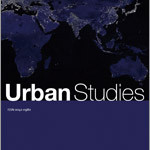Jonathan Rutherford – Urban Energy Transitions
 As we all go busily about our daily lives, only very rarely do most of us consciously think about or visualize the flows, networks, uses and implications of energy underpinning our very existence and the functioning of the cities in which most of us live and work. This backgrounding or taken-for-grantedness is reflected in the urban studies literature where a sustained focus on energy has been, with a few notable exceptions, conspicuous by its near absence.
As we all go busily about our daily lives, only very rarely do most of us consciously think about or visualize the flows, networks, uses and implications of energy underpinning our very existence and the functioning of the cities in which most of us live and work. This backgrounding or taken-for-grantedness is reflected in the urban studies literature where a sustained focus on energy has been, with a few notable exceptions, conspicuous by its near absence.
A recent Special Issue of Urban Studies on ‘Urban energy transitions: places, processes and politics of socio-technical change’ contributes to thinking through the complex, diverse, always emerging and situated relations between energy and cities at a time when these are (re)appearing on political and policy agendas for a host of reasons. Security of energy resources and supply lines, climate change, affordability and accessibility, and governance and management of utilities are some of the ‘big’ stakes and issues through which energy systems are being rethought and reconfigured across North and South, implicitly or explicitly in relation to built environments and urban lives and lifestyles. But, in contrast to much of the normative policy agenda, taken as a whole, the Special Issue does not reduce the urban to a specific location, context, administrative level or actor, and nor does it view the urban as a readily available instrument or tool through which transitions of energy systems (on ‘other’ scales) can be easily deployed. Instead, we study an urban which is a constitutive and inseparable component (or set of intersecting components) of very diverse processes and practices of energy transition across North and South. By reflecting on the urban materialities, imaginaries, controversies and politics through which energy systems do and can change, and thus on what is, but also what might be, a specifically urban socio-technical transition, from Cape Town to London and Amman to Freiburg, we open up theory and practice to actualities and possibilities of urban energy relations which are other than black-boxed, bounded, pre-set and confiscated by governmental actors or transnational utility companies.
Read more: http://urbanstudiesjnl.blogspot.nl/


